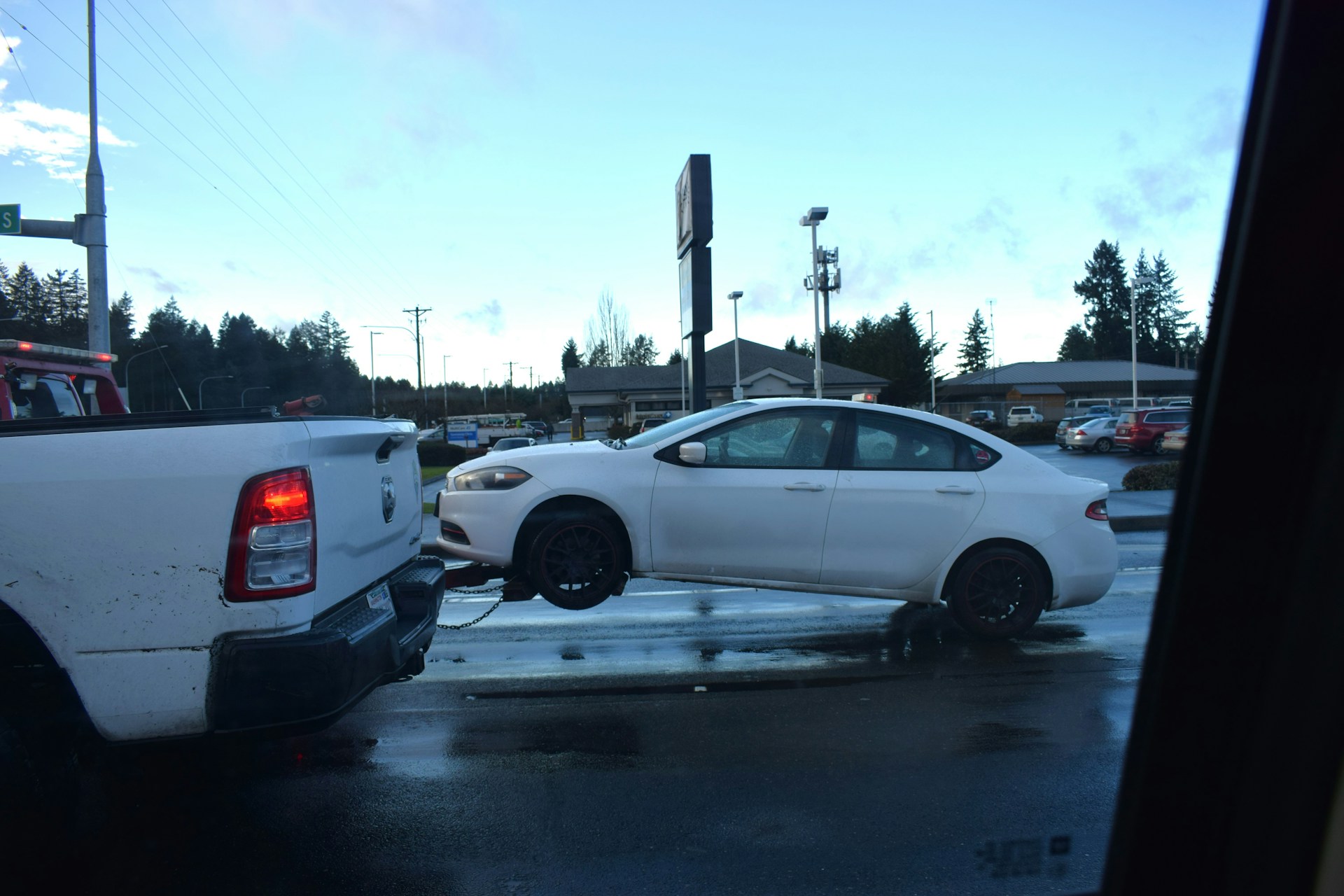Contents
Acquiring a vehicle through a loan comes with the responsibility of making timely payments. However, financial hurdles can sometimes lead to missing these payments, resulting in the risk of having the car repossessed. Understanding how to locate a repossessed car, the implications of repossession, and ways to prevent it is crucial for any car owner facing financial difficulties.
Table of Content
- What Does a Car Repossession Mean?
- Types of Vehicle Repossession
- Finding Out If My Car Is on a Repo List
- What the Repo Man Can Do to Find Your Car
- Can I Get My Belongings Back?
- Preventing Repossession
- Summary
- FAQ
What Does a Car Repossession Mean?
Car repossession occurs when a borrower fails to make loan payments, and the lender takes back the vehicle. This process can be initiated without notice, depending on state laws, as the lender seeks to recover the outstanding debt on the loan. Following the repossession, lenders typically attempt to sell these repossessed vehicles at auction to recoup the unpaid balance of the car loan. Individuals who have their cars repossessed are often given a chance to get their car back by paying the overdue car payments, along with any additional fees incurred during the repossession process, before the sale. However, if the vehicle is sold, the original owner may still be responsible for any deficiency between the sale price and the remaining loan amount. This situation underscores the importance of timely car payments to avoid the financial and emotional turmoil associated with losing a vehicle to repossession.
Types of Vehicle Repossession

There are mainly two types: voluntary and involuntary. Voluntary repossession is when the borrower hands over the vehicle to the lender, acknowledging their inability to meet payment obligations. Involuntary repossession involves the lender employing a repossession company to take back the car, often without the borrower’s prior consent.
In both scenarios, borrowers must confront the financial implications of their situation. To mitigate the impact, it’s advisable for borrowers to proactively communicate with their lenders to discuss potential solutions, such as restructuring the loan to manage past-due payments more effectively. Additionally, borrowers should compare rates from other lenders or financial institutions, as refinancing could offer more favorable terms that ease the repayment process. However, it’s crucial to be aware that both types of repossession can incur other fees, including storage, administrative costs, and any charges associated with the repo agent’s services. These fees add to the total amount that borrowers need to pay to either settle their debt or reclaim their vehicle. Understanding these details helps borrowers navigate their options and potentially avoid the financial strain associated with vehicle repossession.
Finding Out If My Car Is on a Repo List
If you’ve missed payments, it’s wise to contact your lender immediately. They can inform you if your vehicle is slated for repossession. Staying in communication with your lender can provide opportunities to negotiate new payment terms and avoid repossession. In situations where the car is repossessed, understanding the nuances of voluntary repossession could be beneficial. Opting for voluntary repossession can lessen the financial burden since it typically involves fewer fees than if the lender employs repo companies to seize the vehicle. Additionally, once the lender sells the repossessed vehicle, there may still be an opportunity to strike a deal to settle any remaining debt or potentially reclaim the vehicle before it is sold. This proactive approach not only aids in managing the immediate consequences of missing payments but also helps in navigating the complex process following the repossession.
What the Repo Man Can Do to Find Your Car
Repo agents employ various methods to locate a vehicle, including using GPS tracking devices and monitoring the borrower’s home or workplace. They are authorized to repossess the car from public spaces but must not use physical force or enter a locked or closed garage without permission.
Once the lender sells the vehicle, the former owner’s rights to reclaim it diminish significantly. However, understanding the boundaries of a repo agent’s authority can help protect your personal property during the repossession process. If a repo agent has already taken your car, it’s vital to know that while you can no longer get your car back from them directly, there may still be a chance to recover it before it’s sold. This typically involves negotiating with the lender to pay off the outstanding balance plus any additional fees. If the lender agrees to sell the car back to you, this payment could reinstate your ownership. It’s important to act quickly, as once the lender sells the vehicle at auction or through a private sale, the opportunity to regain possession of your car by paying the required amount effectively ends. This scenario underscores the importance of swift action and clear communication with the lender throughout the repossession and sale process.
Can I Get My Belongings Back?
Personal property inside the repossessed vehicle must be returned to the owner. Lenders or repossession companies should provide information on how to retrieve personal items, though they may charge storage fees. To secure your personal belongings, promptly reach out to the company handling the repossession. This ensures that your items are safeguarded and ready for collection. If your goal is to get your vehicle back, engaging in discussions with your lender is crucial. They might allow you to settle the outstanding balance and additional costs to reclaim your car. Strategies such as negotiating a new payment plan or paying the total due amount can be effective. Additionally, understanding the specifics of retrieving a vehicle from a locked garage, if applicable, and familiarizing yourself with the process of a private sale or auction for a repossessed car are important steps in this situation.
Preventing Repossession

The best strategy to avoid repossession is maintaining open communication with your lender, especially when facing financial difficulties. Proposing a new payment plan or seeking refinancing options can help manage the loan more effectively. Additionally, comparing rates from different lenders or contacting a credit union for a more favorable deal might be beneficial.
Ensuring timely car payments and adhering to car loan payments are fundamental to avoiding repossession. If you anticipate difficulty meeting your payment schedule, it’s critical to inform your lender as early as possible. Some lenders may offer temporary relief options such as loan modification or forbearance. Keeping your car insurance current is also essential, as insurance lapses can violate the terms of your loan agreement, increasing the risk of repossession. Moreover, familiarizing yourself with local laws can provide insights into your rights and the lender’s limitations regarding repossession practices. Be mindful of accruing late fees, as these can quickly escalate the loan balance, complicating the repayment process. Proactive financial management and clear communication with your lender can prevent the stressful situation of having your vehicle repossessed.
Summary
Repossession is a challenging experience, but understanding your rights, the repossession process, and actively engaging with your lender can help navigate this difficult situation. Taking proactive steps can prevent repossession and protect your financial health.
FAQ
How Does a Repossession Affect Your Credit?
Repossession significantly impacts your credit score, making future loans and credit opportunities more challenging to secure. It remains on your credit report for up to seven years, underscoring the importance of managing loan payments effectively.
What Happens If the Repo Never Finds a Car?
If a repossession company cannot locate the vehicle, the lender may still pursue the remaining balance of the loan through collections or legal action. The borrower remains responsible for the debt, plus any additional repossession costs and fees.
Is a Repo Worse than a Charge-Off?
Both repossession and a charge-off negatively affect your credit score, but a repossession can be more detrimental because it indicates a default on a secured loan and the loss of valuable collateral—your car. A charge-off, while also serious, typically involves unsecured debt without specific collateral at stake.





